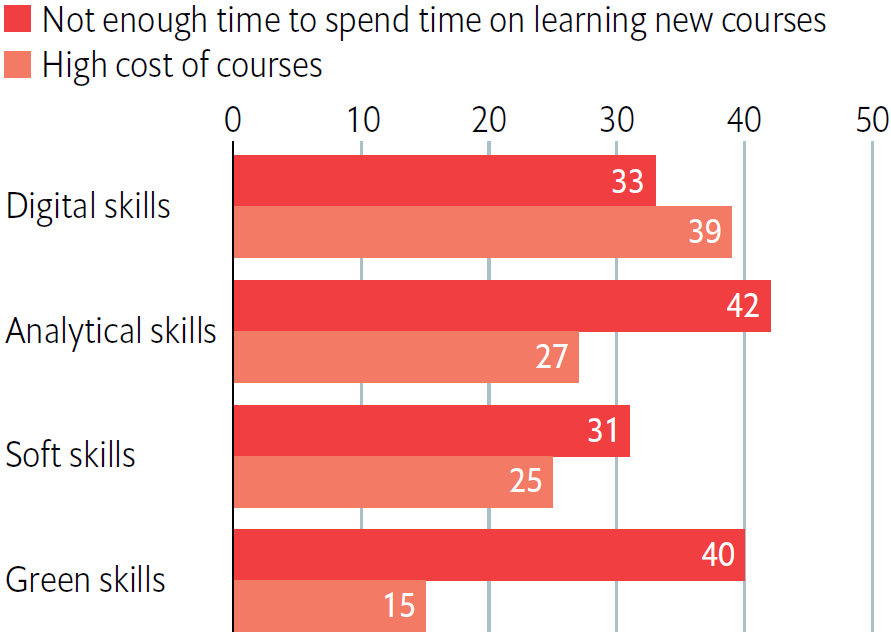Economist Impact, supported by Google, conducted a survey of 1,375 employees across Asia-Pacific (APAC), including 100 employees from Malaysia, between November 2022 and January 2023. It also interviewed employers and industry experts across the region to understand their perspectives on skills gaps, as well as reskilling and upskilling aspirations.
The survey respondents were drawn from across 14 markets in the region, out of which 11.8% were Gen Z (born in 1997-2012), 63.2% were Millennials (1981-96) and 25% were Gen X (1965-80). They all work in a diverse mix of industries.
The research shows that across the region, common understanding is lacking between employers and employees about future skills and the best way to develop them. In some instances, there is also an expectation mismatch between what employers want and what employees see as being important. Understanding these gaps will be instrumental in creating a workforce that is prepared for the economy of the future.
This article—one in a series of 12 market reports—examines these issues in Malaysia. This series complements a research paper that looks at the reskilling and upskilling imperative across APAC.
Key findings
- Digital skills (65%) are the top focus for employees in Malaysia, with most still prioritising basic digital skills (83.1%). Advanced digital skills such as artificial intelligence (AI) and machine learning (ML), cloud computing and cybersecurity are also gaining importance.
- More employees in Malaysia consider soft skills important (54%) than across the region (41.2%), outpolling employees in countries such as Singapore (51%) and Hong Kong (47%). Employees place special emphasis on interpersonal and intercultural communication (81.5%).
- Employees in Malaysia place the bulk of responsibility of upskilling on employers, although the government could provide financial support and work with employers to address the information gap on what skills are needed.
Like many other countries in Asia, Malaysia’s workforce is characterised by an ageing population. Rising youth unemployment, which currently stands at 11.1% adds another layer of complexity to the labour market.1 The country is also facing a brain drain, exacerbating the skills and talent gap. The local 5.6% emigration rate, the share of the native population residing abroad, is higher than the worldwide average (3.6%), and as of 2022 around 1.86m Malaysians have migrated overseas.2 Recent estimates suggest that about US$68bn will have to be spent to adequately upskill 10m Malaysians over the next five years for the country to remain globally competitive.3
On the other hand, as the country experiences a marked shift towards a services-oriented and digitalised economy, businesses have accelerated their adoption of digital platforms, leading to an increase in digital trade, payments and public services,4 increasing the demand for digital skills. In the coming years, preparing and upskilling workers for this digital economy will be key in deriving success from this economy.
Rising importance of advanced digital and soft skills
Our survey finds that 65% of Malaysian employees consider digital skills the most important for the workforce today. The need for tech talent is rapidly increasing among Malaysia’s employers, and the Malaysian Digital Economy Corporation predicts demand will grow at a rate of 7.6% over the next three years.5
Basic digital skills are considered must-haves by 83.1% of employees in Malaysia (similar to the regional trend). Advanced digital skills such as data analysis and visualisation (49.2%) and digital marketing (47.7%) are also viewed as must-haves. A 2021 research revealed that more than 80% of Malaysian businesses consider data analytics a vital technology for growth.6 Our survey finds that other skillsets such as cybersecurity (35.4%), cloud computing (35.4%), and AI and ML (20%) are also important.
These findings echo government research from 2021 that identified big data analytics, AI, data science and cybersecurity among the top in-demand digital skills in Malaysia.7 As digitalisation progresses in Malaysia, the demand for cybersecurity experts and data professionals is mounting, which has prompted the government to establish plans to train and develop 50,000 cybersecurity and data professionals by 2025.8 The rising importance of cybersecurity is in context of higher risks that the country increasingly faces. Based on an analysis of millions of breached accounts globally between April to June 2022, Malaysia was the 11th most data-breached country.9
Karen Yap, managing director at Kuala Lumpur-based recruitment firm, Connect Gateway Executive Search, reinforces the economic importance of emerging technologies in achieving Malaysia’s long-term economic growth. She cites the recent example of Malaysia’s digital economy blueprint, which indicates that technologies such as AI can increase the country’s GDP by up to 26% in the next decade.
Figure 1: Must-have, good-to-have and not needed digital skills for employees in Malaysia
How useful are particular skills for the workforce in your sector today? (% of respondents)

Source: Economist Impact, 2023
Beyond digital skills, more than half of employees in Malaysia consider soft skills as important (54%), higher than the regional average (41.2%). Within the category of soft skills, employees rank interpersonal and intercultural communication (81.5%), leadership and the English language (66.7% respectively) as their top must-haves. Ms Yap says this might be due to the diversity of Malaysian workplaces and culture—soft skills empower employees “to deal with people from different backgrounds and enable effective cross-cultural communication”. The survey also suggests that employees are strongly motivated to acquire soft skills for their personal development and lifelong learning (41%).
Green skills are not currently a high priority for employees in Malaysia, with only 15% considering them important. Yet there will be an imperative to drive more green upskilling and reskilling as the pressures of climate change and the sustainability movement bear down on Malaysia. There has been some progress: in 2019 the government launched a Green Technology Master Plan that set out a framework for a Green Jobs Programme to transition the economy towards sustainable and inclusive growth.10
Employer and government collaboration can support upskilling
The survey reveals that Malaysian employees are motivated to acquire new digital skills to increase their salaries and bargaining power (30%) and to advance their career prospects (28%). However, the most significant obstacle to upskilling in Malaysia is cost, with 39% of employees reporting that expensive courses prevent them from acquiring new digital skills— higher than the regional average of 28.6%. Employees also report that a lack of time is a key barrier in acquiring analytical, green and soft skills.
Additionally, access issues hinder employees’ learning opportunities. A third of respondents cite poor internet access as a barrier to learning new digital skills, for example. This is despite high rates of internet penetration. Nevertheless, there is a digital divide between urban and rural communities, and a widening gap between high-income and low-income groups hampering even access to upskilling opportunities.11
Figure 2: Lack of time and cost of courses are barriers to skilling Malaysia
What are some of the most significant obstacles that you face while learning new digital, analytical, soft and green skills? (% of respondents)

Source: Economist Impact, 2023
Across almost every category, employees consider employers responsible for supporting their skilling needs, except when it comes to financial incentives, which are considered a government responsibility (47%). Ms Yap agrees and points to the long-standing existence of the Human Resource Development Fund, the statutory body in charge of funding upskilling needs. The government has also embarked on several initiatives to boost employment, such as its Jamin Kerja programme, which comprises a broad suite of policies such as wage subsidies and upskilling/reskilling and job guarantee programmes.12
Figure 3: Role of government and employers for upskilling Malaysia
In your opinion, is the government, your employer or yourself responsible for support with the following issues? (% of respondents)

Source: Economist Impact, 2023
A first step for both employers and the government is to clearly communicate the information on which skills are in demand: our survey reveals that 57% of respondents report a poor understanding of what skills are demanded by employers. The government could leverage its awareness programmes to address the information gaps—48% of employees already consider such initiatives essential for obtaining the right information on skills while 52% of employees rely on their employers to learn more about the key in-demand skills.
Employers can also create an environment that makes learning an integral part of work culture, especially when many employees juggle long hours and struggle to find time for learning. Ms Yap suggests that firms could make continuous learning a formal and structured aspect of the workplace. The organisation could allow employees to self-direct their learning if it is aligned with their roles and provide financial support to them, she says.
References
2 https://www.straitstimes.com/asia/brain-drain-majority-of-malaysians-who-migrated-moved-to-singapore-says-hr-minister
4 https://documents.worldbank.org/en/publication/documents-reports/documentdetail/099063502042320186/p179681008aa910db0bca9057d2dfa76bed
8 https://www.nst.com.my/lifestyle/bots/2021/07/708180/tech-addressing-digital-skills-gap-technology-sector








